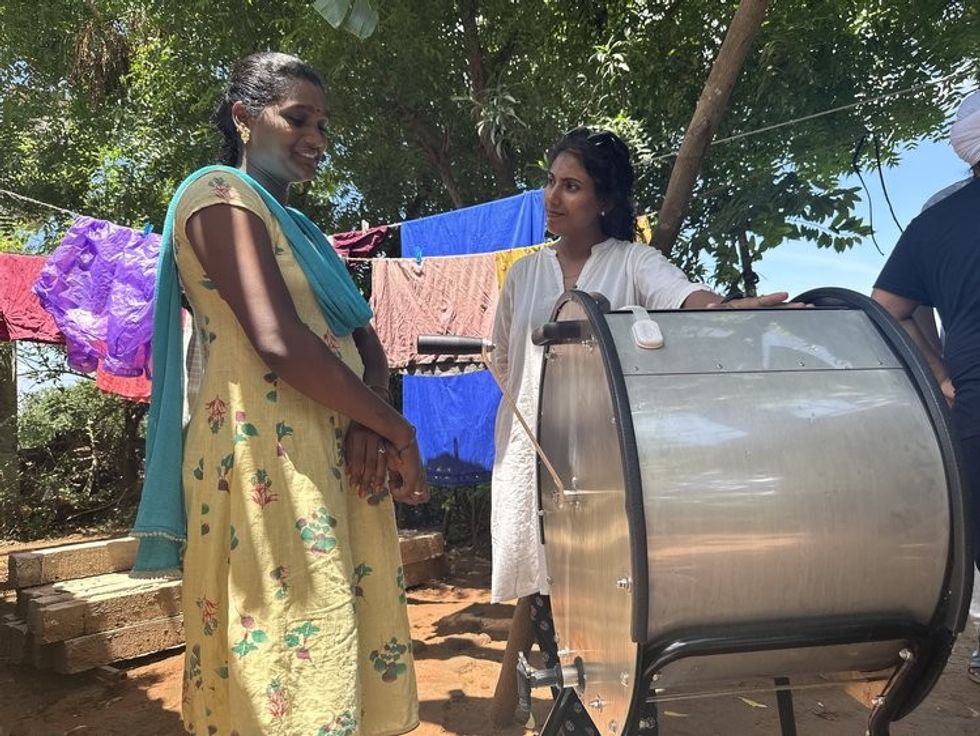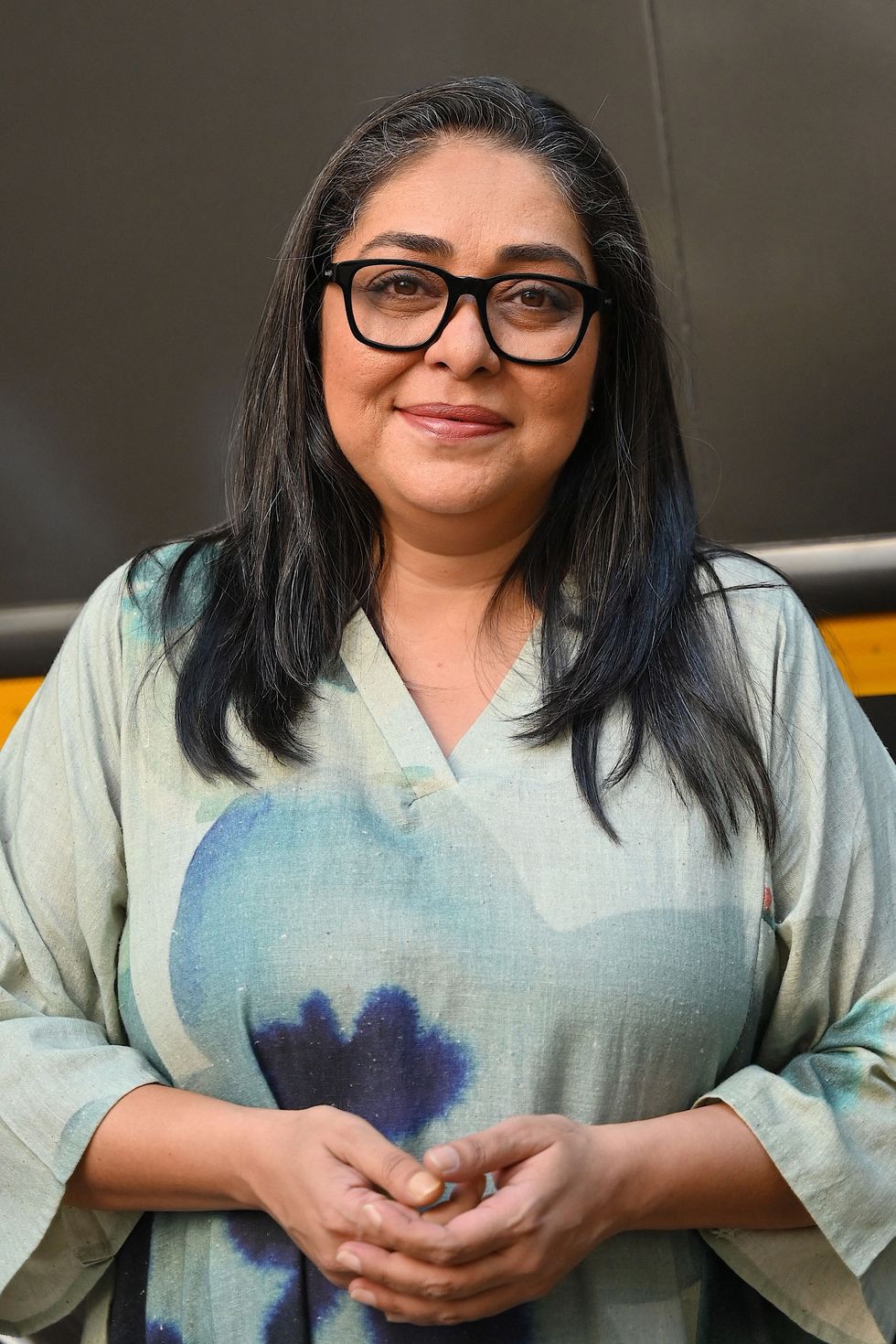THE ASIAN founder of a start-up has revealed his ambition to bridge the “global washing divide” as he announced a collaboration with Whirlpool Foundation to help families in low-income and displaced communities.
Navjot (also known as Nav) Sawhney is the founder of the Washing Machine Project, which aims to alleviate the burden of hand washing clothes across the world.
The Divya washing machine is said to be the world’s first flat-packable manual washing machine, aimed at use by families in under-developed, poor and even war-torn nations where communities don’t have access to a reliable and regular power supply, as well as a stable water connection.
On April 15, the project has joined hands with Whirlpool Foundation to develop and deliver 10,000 manual washing machines to struggling communities across the world over the next five years.
“Whirlpool (which invented the electric washing machine over 100 years ago) will help manufacture these machines, first in the US, but also perhaps in India and Mexico. These machines will be distributed in different communities and they are expected to impact over 150,000 lives,” Sawhney told Eastern Eye in an interview last week.
The collaboration will focus on an estimated 60 per cent of the world’s population who rely on washing clothes by hand, something both the Washing Machine Project and the Whirlpool Foundation recognise as the “global washing divide”.

Sawhney told Eastern Eye he is determined to bridge the “laundry gap”, thus alleviating the burden that tends to disproportionally fall on women and young girls.
According to the World Health Organization, 70 per cent of households worldwide depend on women and girls for water collection and laundry. Up to 20 hours each week are spent hand washing clothes in underserved communities globally.
In its first five years, the Whirpool-Washing Machine Project collaboration is expected to unlock approximately 17 million hours for women and girls, thus improving their quality of life.
Sawhney told Eastern Eye, “People in the US, UK and Europe have access to seamless electric washing machines at home, but huge parts of the rest of the world still don’t use an electric washing machine as they have limited or no access to electricity and/ or water supply. They are left with no choice but to hand wash each piece of clothing.
“So yes, it’s a continuous effort to try and get people to understand and realise this is a major world problem. The most staggering issue is that, unfortunately, this issue disproportionately affects women and girls, denying them opportunities to work, study and rest. It’s frustrating.”

Earlier this year, Sawhney and his team were at Whirlpool headquarters in Michigan, US, where they urged the employees to hand wash clothes so they could understand and empathise with the millions of women who are tasked with this daily chore.
An engineer by education, Sawhney, 33, left a high-paying job to join Engineer Without Borders. It was through the organisation that he visited a small town in south India in 2017 to work on developing clean and efficient cook stoves.
At the time he became friends with a neighbour, Divya, who spent a considerable amount of her time hand washing her family’s laundry. Sawhney promised Divya a better solution to her problems, a vow he recently fulfilled.
He told Eastern Eye, “We just come back from a distribution in India, where we were in Pondicherry (Puducherry) for a couple of weeks, and I managed to honor my promise – of creating a washing machine for my friend Divya. After seven long years, we were able to give her a washing machine which I eventually named after her.”
It was an emotional moment filled with tears and laughter, when the Divya Washing Machine was presented to its namesake, Sawhney said. His mission is to find more women like her to alleviate their burden, Sawhney said.
He added, “I never imagined in my wildest dreams that we’d be here today, talking about this amazing announcement.
“I just wanted to make a washing machine for my friend Divya to alleviate her burden. When I finally met her and presented her what was promised, she said, ‘Nav, there are millions more like me around the world. So go find them as they all need your support’. And that’s exactly what we’re doing.”
In recent years, Sawhney supplied handcracked off-grid washing machines to communities in need, including in refugee camps in Iraq, through partnerships with organisations like the United Nations and Oxfam.
He said, “It’s been quite a journey for us. Our team has now grown, and we have now positively impacted over 30,000 people around the world, distributing machines across 15 countries. This latest collaboration will help us to scale us more exponentially.”
“I think this is a true example of when purpose meets technology for the betterment of humanity. And I am so excited to bridge this washing divide.”
The Washing Machine Project currently employs 11 people, but has an army of volunteers all over the world as well, he said.
The London-born engineer’s initiative is now being recognised on a wider level.
At a recent Vaisakhi celebration at Downing Street on April 17 (two days after the collaboration with Whirlpool was announced), prime minister Rishi Sunak gave a shout-out to Sawhney, calling him “extraordinary” and naming him among “incredible exemplars” of Sikh values of compassion, equality, and service.
Sawhney said, “This is a massive team effort and I’m one of many people who are working on this initiative.”
“It feels good to see recognition for the Washing Machine Project as it means we can create more positive impact in the world,” he added.
Last year, Sawhney was honoured with Point of Light award as recognition for his work with women in developing countries.
“We won the Point of Light award last year. I was invited to the King’s coronation lunch at Downing Street with my mom, which was a really proud moment for me. The award led on to some phenomenal conversations, partnerships and collaborations.”
Sawhney said he is happy to have found his ikigai in life, a Japanese concept referring to something that gives a person a sense of purpose and a reason for living.
He said, “I’m so proud I’ve found this purpose, vision and mission. This is something that’s so close to my heart, especially as I am born and raised in a family of all women.”
Sawhney counts his ethnic minority background as his “superpower”.
“Sometimes, I am the only person in the room who is brown and definitely the only person in the room with a turban. I never shy away from that part.
“In fact, I understand the weight of this representation. I am proud of my heritage and my ancestors – I’m standing on the shoulders of giants. I am just lucky that I have skills that I can put to good use and help the world in some form,” he added.



















 Anil Kapoor
Anil Kapoor Tanisha Mukerji
Tanisha Mukerji  Meghna Gulzar
Meghna Gulzar Deepika Padukone
Deepika Padukone Randeep Hooda
Randeep Hooda Rasika Duga
Rasika Duga Shah Rukh Khan
Shah Rukh Khan Pankaj Tripathi
Pankaj Tripathi Vidya Balan
Vidya Balan  Kartik Aaryan
Kartik Aaryan Parineeti Chopra
Parineeti Chopra Manoj Bajpayee
Manoj Bajpayee Akshay Kumar
Akshay Kumar 

 Writer-director Aysha Rafaele
Writer-director Aysha Rafaele Julia Davis appears as Shakil's doctor
Julia Davis appears as Shakil's doctor